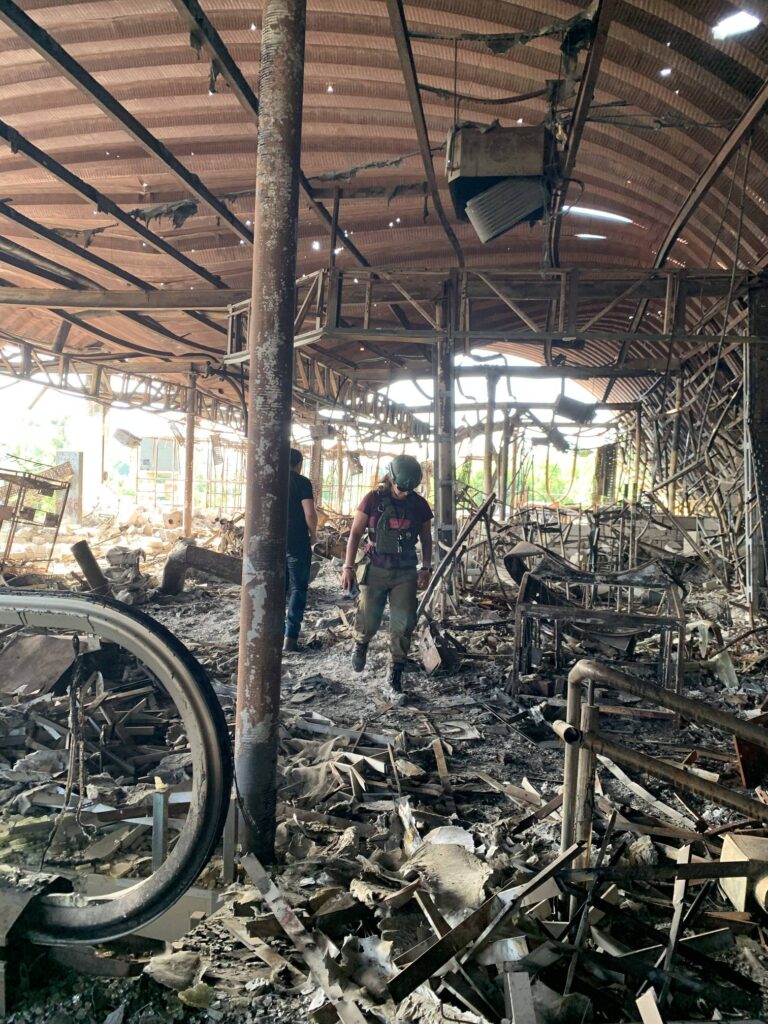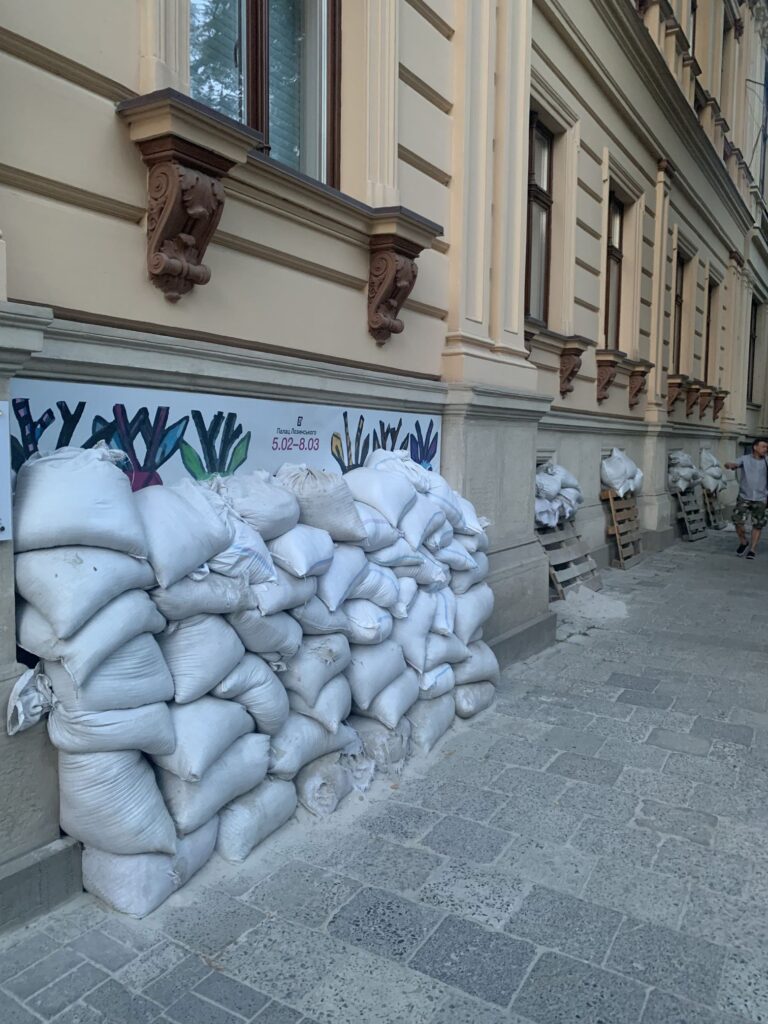Sometimes you have to dig for the truth. Sometimes it’s like pulling teeth (out of your grandmother’s mouth). My Bapci, Anna Udycz, was reluctant to tell me stories about her life when I was perhaps too young to handle it, but over the past decade, I have been drawing it out of her.
Anna’s father was taken away by Polish soldiers to a Siberian prison in 1945. She was evacuated from her home twice due to various annexations of Ukrainian land. Both she and my Gido (grandfather) spent time evading invading armies by hiding in forests and caves, surviving by seemingly impossible means. They also faced discrimination wherever they went.
My Bapci‘s determination to provide a better life for her family led her to make the life-changing decision to come to Canada 60 years ago. Her stories detail events not dissimilar to those of other migrants who have come to start a new life here in Canada.
As a third -generation Ukrainian Canadian, my perception of courage has been shaped by the stories of my ancestors, who lived through the horrors of war and displacement in Ukraine, and now have to relive it again today. So, when Russia launched their full-scale invasion of Ukraine on February 24 2022, I—like numerous others in the Ukrainian diaspora who were safely nestled out of reach of Russia’s missiles—was overwhelmed with a profound sense of helplessness and despair. I grappled with survivor’s guilt, plagued by a visceral urge to assist in any way possible, but with no clue as to how to do so.
After spending many sleepless nights glued to Telegram channels, crawling news headlines, texting random Russian phone numbers and posting incessantly on social media, I finally caught wind of a small start-up Canadian NGO that was offering much-needed help to displaced Ukrainians. I joined a team of a handful of folks working to help war-displaced Ukrainians come to Canada through the CUAET program.

In June of 2022, five months after Russia’s invasion,I visited Ukraine for the first time and I was gobsmacked. The sights were beautiful—the intricate architecture, the natural landscapes teemed with life, with much of the art and culture inspired by it. (Ukrainian culture is very intertwined with nature, a nod to our pagan roots). Even the juxtaposition of cultural landmarks fortified with sandbags had a unique and striking beauty.
During my two weeks there, I was sitting in a restaurant watching children from one family run around to join the table of another, because in Ukraine, children are the collective responsibility of society. I had heard from my family that Ukraine has a communal spirit and I am sure war has a unifying effect that probably exaggerated this camaraderie, but being there, it became real, and it gave me a sense of urgency to protect and preserve this way of life at all costs. I felt the deep sense of community that permeated every interaction.
Since 1917, Ukraine’s struggle to establish its own national identity separate from Russia has been a revolution against Russian domination. A significant transformation that has taken place as Ukraine moves towards the West is the shift in how Russia views itself, perhaps in part as a result of how the world now views Ukraine.
Previously, Ukrainians were viewed as “lesser Russians.” This perception was reinforced by the suppression of Ukrainian culture and the portrayal of Ukrainians as a “peasant” nation, while Russian culture was considered superior and more sophisticated.
As Ukraine continues to establish its own distinct national identity, and proudly expresses and cultivates its unique culture separate from that of Russia, it has caused a sense of disorientation for Russia. It cannot comprehend a world in which former Soviet Union countries seek to define themselves as distinct entities from Russia; they cannot comprehend a reality in which these nations no longer romanticize and idealize them. I believe what we are witnessing today is a narcissistic collapse—a self-centered disintegration of an imperial nation who has been forced to look in the mirror. Russia is confronting its own shadow.
My limited exposure to Ukrainian culture through the diaspora had gaps. However, experiencing Ukrainian culture firsthand in Ukraine emphasized the significance of interconnectedness and diversity. It also prompted me to recognize the necessity of protecting and preserving our culture beyond just having Ukrainian communities in Canada. It left me conflicted about where to focus my time and energy. Reflecting back on this, I realize that my shift from a Canadian-centric approach to a more Ukrainian perspective coincided with a shift from helping people leave to helping people stay.
Along with this shift in perspective came some issues within the organization, including the hallmarks of opportunism and deception. Unfortunately, I learned that exploitation of a conflict for personal gain is rampant in humanitarian networks. It not only intensifies the suffering of those already affected, but it can also undermine the efforts of well-meaning individuals. Lies, no matter how seemingly innocuous, can completely sour the mission. For myriad reasons, I realized I was serving the wrong agenda, and I left.
For a few months, it felt like I was back to square one—spiraling and untethered, drifting without a clear purpose and focused means to offer help. I had experienced burnout before, but this was a special kind of scorched earth;a total depletion of my physical, mental, emotional, and spiritual reserves. I was also struggling to adapt to “normal life” back in Canada, coping with the fact that the news cycle had moved on from Ukraine.
After regaining my footing back on Canadian soil, I pivoted my focus to finding ways to elevate Ukrainians in Ukraine. While this pivot was my own personal revolution, I do believe that dedicating time and resources to helping people leave Ukraine rather than focusing on solving the problems within the country are problematic.
Firstly, it can perpetuate a “brain drain,” where talented and educated people leave the country, leaving behind a lack of skilled workers and hindering the country’s development.
Second, it can create a sense of dependency on external assistance rather than empowering Ukrainian people to take control of their own fate and future, ultimately hindering the development of local organic solutions and sustainable change.
Third, it does not address the root causes of the problems people are fleeing from, such as political instability, economic inequality, or human rights abuses. Without addressing these issues, people may continue to flee, creating a never-ending cycle of displacement and migration, further weakening an already vulnerable nation.
Finally, focusing solely on helping people leave the country can perpetuate a negative narrative about the country and its people, ignoring the positive aspects of its culture and potential for growth and development.
This exacerbates the phenomenon of “Westsplaining,” which is when Westerners presume to know best what non-Westerners should think or do, often in a condescending way. Cultural imperialism reinforces the power imbalance between the West and the rest of the world, and emboldens aggressors like Russia.

Although it was crucial to assist Ukrainians escaping dangerous hot zones to be able to save many lives, I feel that it cannot be the sole focus of efforts to address the challenges faced in the war. Doing so plays right into Russia’s hands. As a nation with the world’s largest Ukrainian diaspora prior to the war, we have a responsibility to do more. If we truly want to make a difference, we need to address the virus, not just the symptoms.
One danger of Western influence over Ukraine in this conflict is that it weakens Ukraine’s national identity and autonomy as a sovereign nation. Instead of making decisions for Ukraine, I wanted to be among those who would empower them to make their own decisions.
That’s why the spirit of brave, steadfast defiance and spitting in the face of fear mongering led me to support the Kyiv Independent, an independent English-language media outlet in Ukraine dedicated to exposing corruption and championing journalistic integrity. Their journalists have visited some of the most contentious hot spots like Bakhmut, recording perspectives from all sides, including pro-Russian civilians who are called zhduny, meaning “those who wait” in Russian. They have also investigated institutions supporting Ukraine, like the International Legion, investigating the alleged misconduct by the Legion’s leadership to hold responsible parties accountable for cleaning up their messes.
They take great risks to de-corrupt Ukraine and to elevate the voices of those actually affected in this war. I feel it is essential to support their unwavering dedication to the truth, which is the foundation upon which Ukraine needs to build its future.
There is a parallel between the way Westerners impose their perspectives and agendas onto conflicts in other countries and how Russia perceives Ukraine as inferior. It’s important to seek primary sources to align contributions with the values and needs of those affected. Prioritizing the perspectives and experiences of those impacted by conflicts, along with Western tendencies to impose their own agendas, highlights the need for a fundamental change in the way conflicts are addressed and power dynamics rebalanced.
Having witnessed the corruption prevalent in many humanitarian networks, I developed a healthy discerning perspective towards charitable endeavors. And my journey to Ukraine has instilled within me a newfound reverence for my ancestry and roots, forging a deep emotional bond with the land. The thought of returning to the soil where my ancestors walked fills me with gratitude and a burning desire to repay their courage for journeying to an unknown land to ensure our continuation.
I recently quit my job at Corus Entertainment Inc., one of Canada’s largest media companies, to support the Kyiv Independent. Since December, I’ve been overhauling and bolstering their social media strategy and working with them to help amplify their important work. It has been the most fulfilling and inspiring job I’ve ever had, and the reason for my return this spring. I hope to be there for the day we can claim victory.




